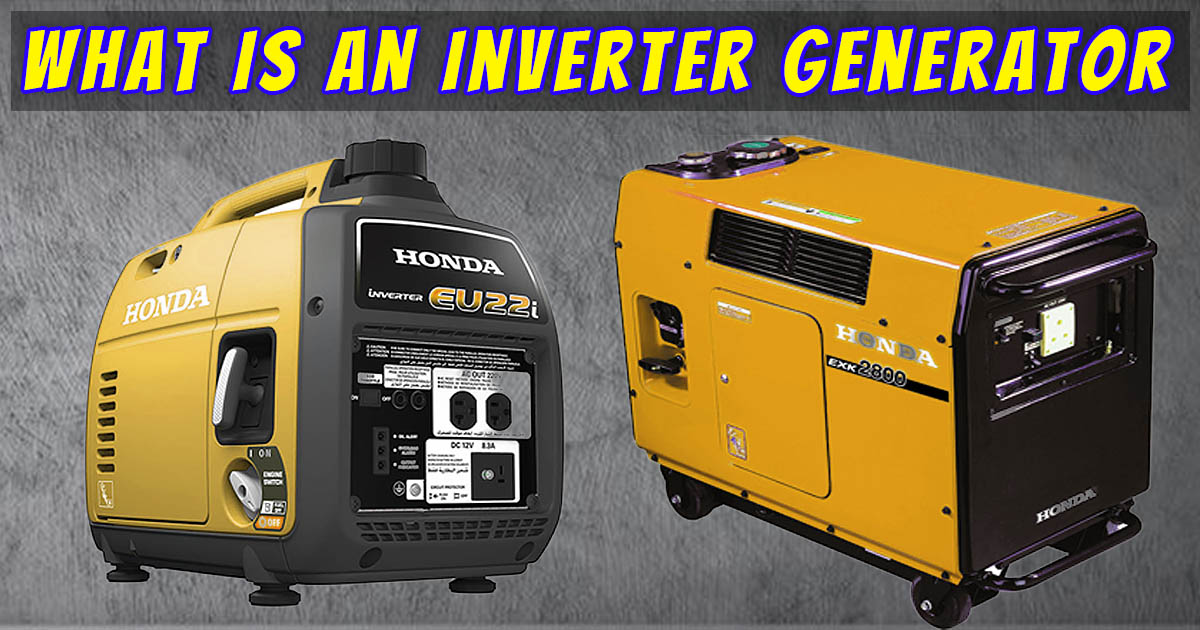Inverter generators have gained popularity for their efficiency and portability, especially in situations where consistent, clean power is essential. But what is an inverter generator? Whether you need backup power at home, a portable solution for camping, or a reliable source for RVs, here are seven key benefits of using an inverter generator:
- Fuel Efficiency: Inverter generators are designed to adjust their engine speed according to the power demand, which reduces fuel consumption and makes them more economical.
- Quiet Operation: Unlike traditional generators, inverter generators operate at lower decibel levels, making them ideal for use in noise-sensitive areas such as campsites or neighborhoods.
- Portability: Most inverter generators are lightweight and compact, allowing for easy transport and setup, whether at home or on the road.
- Clean Power Output: The inverter technology ensures that the power produced is free of voltage fluctuations, making it safe to use with sensitive electronics like laptops, phones, and medical devices.
- Parallel Capabilities: Many inverter generators offer the ability to connect two units in parallel, effectively doubling the power output for larger needs without sacrificing efficiency.
- Longer Lifespan: Due to their efficient operation and lower engine speeds, inverter generators tend to have a longer lifespan compared to conventional generators.
- Eco-Friendly: With lower emissions and better fuel efficiency, inverter generators are more environmentally friendly, producing fewer pollutants and conserving energy.
These benefits make inverter generators a great investment for anyone in need of a reliable and efficient power source.
What Is an Inverter Generator and How Does It Work?
An inverter generator is a type of generator that produces cleaner and more stable power compared to traditional generators. Unlike conventional models that run at a constant speed, an inverter generator adjusts its engine speed based on the electrical load. This means it only works as hard as necessary, making it more efficient and quieter. For a more detailed explanation of what an inverter generator is and how it operates, check out this Consumer Reports – Inverter Generators Buying Guide
The core of an inverter generator’s operation lies in its ability to convert AC (alternating current) power into DC (direct current) and then back into AC. This process smooths out fluctuations in the electrical output, delivering a steady stream of power, which is crucial for running sensitive electronics like computers, medical devices, and televisions without risking damage.
Inverter generators are ideal for both recreational and residential use due to their compact size, quiet operation, and reliable power output. Whether you’re camping, using an RV, or need emergency backup power at home, inverter generators can meet your needs effectively.
Inverter Generator vs Traditional Generator: Which One Is Better?
Choosing between an inverter generator and a traditional generator depends largely on your specific needs. Here’s a breakdown of the key differences:
- Fuel Efficiency: Inverter generators win in this area. They adjust their engine speed based on power demand, whereas traditional generators run at a constant speed regardless of the load, consuming more fuel.
- Noise Levels: Traditional generators are known for being loud, often exceeding 70 decibels, which can be disruptive in residential or outdoor settings. In contrast, inverter generators operate quietly, often in the range of 50-60 decibels, making them more suitable for noise-sensitive environments.
- Power Output Quality: Inverter generators provide “clean power,” which means the voltage and frequency are stable, making them safe for sensitive devices. Traditional generators, on the other hand, can experience fluctuations that may harm electronics.
- Portability: Traditional generators tend to be larger and heavier, while inverter generators are more compact and lightweight, making them easier to transport.
- Cost: Traditional generators are usually less expensive upfront, but the long-term savings from fuel efficiency and durability make inverter generators a worthwhile investment for many.
Ultimately, inverter generators are a better choice if you prioritize quiet operation, fuel efficiency, and the ability to power sensitive electronics. However, if you need a larger, more powerful generator for industrial use, a traditional generator might be a better fit.
Top Uses for Inverter Generators: Home, Camping, and More
One of the greatest advantages of inverter generators is their versatility. Here are some of the top uses for inverter generators:
- Home Backup Power: Inverter generators are perfect for providing backup power during a home emergency or blackout. Their clean and stable power output ensures that your sensitive appliances, like refrigerators, TVs, and computers, remain functional without risk of damage.
- Camping and Outdoor Activities: Because they are compact, lightweight, and quiet, inverter generators are ideal for camping trips. You can run small appliances like portable stoves, coffee makers, and lights without disturbing the natural tranquility of the outdoors.
- RV Use: Inverter generators are widely used by RV owners to power their vehicle’s appliances, air conditioning units, and entertainment systems. Their ability to generate clean power ensures that your electronic gadgets remain safe while on the road.
- Tailgating and Events: If you’re attending a tailgate party or an outdoor event, inverter generators can power speakers, cooking equipment, and even small refrigerators, enhancing your experience.
Their flexibility makes inverter generators the go-to option for various power needs, offering efficiency and reliability across different scenarios.
Why Inverter Generators Are More Fuel-Efficient
One of the most significant advantages of an inverter generator is its fuel efficiency. Traditional generators run at a constant speed, regardless of the load. In contrast, an inverter generator adjusts its engine speed to match the power demand. This variable speed feature significantly reduces fuel consumption, as the generator only produces the amount of power required at any given time.
For example, if you’re using an inverter generator to power a few small devices, it will lower its engine speed, reducing fuel consumption and saving you money. This efficiency also translates to a longer runtime on a single tank of gas, which is crucial during extended power outages or camping trips.
The fuel efficiency of inverter generators not only makes them cost-effective but also reduces their environmental impact, as they emit fewer pollutants than traditional models.
Are Inverter Generators Safe for Sensitive Electronics?
Yes, inverter generators are safe for sensitive electronics like laptops, smartphones, and medical devices. One of the main features that set inverter generators apart from traditional models is their ability to produce clean power. Clean power means the voltage and frequency are stable, with minimal fluctuations.
Traditional generators can produce spikes or surges in power, which can damage delicate electronics. In contrast, inverter generators use advanced technology to convert raw AC power to DC and then back to clean AC power, ensuring that the electricity supplied is as stable as what you’d get from a regular power outlet at home.
This feature makes inverter generators an ideal choice for anyone looking to protect their sensitive devices during a power outage or while camping or traveling in an RV.
What to Consider When Buying an Inverter Generator
Before purchasing an inverter generator, it’s essential to consider several factors to ensure you’re getting the best model for your needs. Here’s a list of key considerations:
- Power Output: Determine how much power you need by adding up the wattage of the devices you plan to run. Ensure the inverter generator you choose can handle the load.
- Portability: If you plan to use the generator for camping or other outdoor activities, make sure it’s lightweight and easy to transport.
- Noise Level: Check the decibel rating, especially if you’re using it in a noise-sensitive environment. Inverter generators are typically quieter than traditional models, but some are quieter than others.
- Runtime: Look for a model with a long runtime, especially if you need it for extended power outages. A generator with good fuel efficiency will run longer on a single tank of gas.
- Parallel Capabilities: If you anticipate needing more power in the future, consider a model that allows for parallel operation, which lets you connect two inverter generators for double the output.
- Price and Warranty: While inverter generators can be more expensive, look for one that offers a good balance between price and features. Also, check the manufacturer’s warranty for added peace of mind.
By considering these factors, you can find an inverter generator that perfectly matches your power needs and budget.
Conclusion: Why Inverter Generators Are the Future of Power Generation
Inverter generators are revolutionizing the way we generate and use power. With their fuel efficiency, quiet operation, and ability to produce clean power, they offer several advantages over traditional generators. Whether you need a reliable backup during power outages, a portable solution for outdoor activities, or a safe option for powering sensitive electronics, an inverter generator is a smart investment.
As technology continues to advance, inverter generators are expected to become even more efficient and environmentally friendly, making them the go-to choice for future power generation needs.
FAQs About Inverter Generators
- What is the difference between an inverter generator and a conventional generator?
An inverter generator adjusts its engine speed based on power demand, offering better fuel efficiency, quieter operation, and cleaner power output than conventional generators. - Are inverter generators quieter than traditional generators?
Yes, inverter generators are significantly quieter due to their variable engine speed and advanced noise reduction technology. - Can an inverter generator power a whole house?
Inverter generators are typically used for smaller loads, but some models can provide enough power for essential appliances during an outage. For full-house power, you may need a larger or parallel-connected system. - How long can an inverter generator run on a tank of gas?
This depends on the model and load, but inverter generators are generally more fuel-efficient, offering longer runtimes compared to traditional generators. - Is an inverter generator worth the extra cost?
Yes, for most users, the extra cost is worth it due to the fuel savings, quieter operation, and the ability to safely power sensitive electronics.
Visit my homepage for more tips on choosing the right generator and other power solutions

Joseph Bush is a seasoned writer and researcher with over 7 years of experience covering a wide range of general topics, from lifestyle and technology to business and current events. He is dedicated to producing fact-checked, reader-friendly content that informs, engages, and empowers readers.
Throughout his career, Joseph has followed strict editorial guidelines, relied on reputable sources, and ensured every article meets the highest standards of accuracy and clarity. His expertise spans multiple fields, allowing him to explain complex topics in a way that’s easy to understand.
Passionate about continuous learning, Joseph stays updated on industry trends and best practices to deliver trustworthy, well-rounded insights. Readers can rely on his work for its credibility, depth, and real-world relevance.




